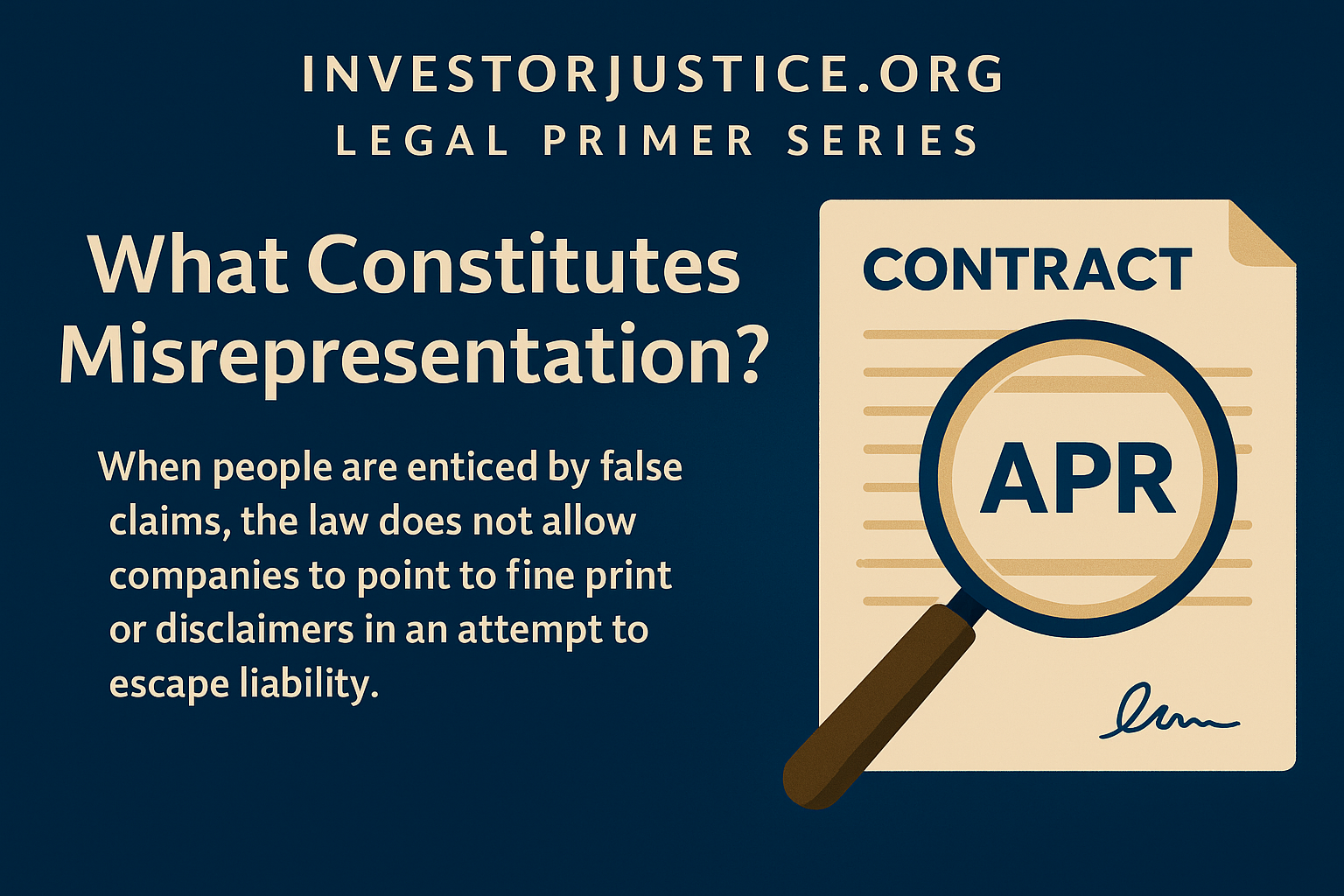Table of Contents
Across jurisdictions, “APR”, Annual Percentage Rate, is not a branding term. It is a statutory disclosure that assumes repayment of a credit balance over time, with a predictable cost of credit.
When a product instead liquidates investor collateral midstream, the APR label becomes false and unlawful under multiple regulatory frameworks. And removing the term later does not erase the illegality of the original offer.
1. Illegality is fixed at the time of the offer
Under U.S., Swiss, EU, and Cayman law, a product’s legality is assessed when it was marketed and sold, not when a company later changes its wording or structure.
- United States (Truth in Lending Act, Regulation Z): Misstating or misusing “APR” violates consumer-disclosure duties even if the representation is later corrected.
- Switzerland (Code of Obligations, Art. 19–20): Contracts that breach statutory definitions — such as representing a margin account as a fixed-rate loan — are void ab initio (from inception).
- European Union (Consumer Credit Directive 2008/48/EC): A misleading APR at the point of sale constitutes a violation regardless of subsequent edits.
- Cayman Islands: Later deletion of “APR” does not retroactively comply with Monetary Authority or consumer-protection standards.
The relevant legal moment is when investors were induced to rely on the representation. That inducement cannot be undone by a later rebranding.
2. Retroactive edits do not cure prior violations
Once a misleading credit representation is made, it becomes part of the regulatory record.
Subsequent “cleanup” changes, such as removing “APR” from advertising, may reduce future risk, but they do not sanitize prior misconduct.
Regulators frequently view such edits as probative evidence of awareness of non-compliance.
In enforcement practice, post-facto deletion is treated as an implicit acknowledgment that the original structure breached disclosure laws.
3. APR means repayment, not forfeiture
The concept of APR presumes:
- Fixed or amortized repayments
- Transparent cost disclosure
- Predictable duration and terms
A margin-based credit line, where collateral can be liquidated at arbitrary market prices, cannot legally carry an APR, because the total repayment cost is neither fixed nor ascertainable in advance.
Labeling such a product with “APR” creates the impression of safety, regularity, and repayment predictability that does not exist.
4. Cross-border recognition of the principle
Though terminology differs, the rule is consistent internationally:
United States: Truth in Lending Act (TILA), Regulation Z — APR misuse is a per se disclosure violation.
European Union: Consumer Credit Directive (2008/48/EC) — Misstating APR invalidates compliant disclosure status.
Switzerland: Consumer Credit Act (Art. 9–10), Unfair Competition Act (Art. 3(1)(b)) — Use of APR for liquidation-based credit is unlawful.
Cayman Islands: Monetary Authority Act — Misrepresentation of regulated features (like APR) constitutes misleading conduct.
The common denominator: later withdrawal of a term does not extinguish liability for its prior use.
5. Probative value of removal
When a company removes “APR” reference from advertising and marketing between product versions, regulators treat this as circumstantial evidence of consciousness of breach.
It does not, by itself, prove intent but it supports an inference of awareness that the initial advertising was incompatible with applicable credit or disclosure law.
6. Investor takeaway
If you were shown “APR” in marketing for a product that can liquidate your assets, the illegality does not vanish when the company deletes the term.
Your reliance occurred under the original representation and that moment fixes liability.
In every jurisdiction examined, removing “APR” from advertising and marketing does not make a liquidation-based product legal.
Sources
- Evidentiary Brief: Illegality of APR Coupled with Liquidation (InvestorJustice.org, Sept. 2025)
- Truth in Lending Act (15 U.S.C. §1601 et seq.) and Regulation Z (12 C.F.R. Part 1026)
- EU Consumer Credit Directive 2008/48/EC
- Swiss Consumer Credit Act (SR 221.214.1), Unfair Competition Act (SR 241), Code of Obligations (SR 220)
- Cayman Monetary Authority Act (2020 Revision)









